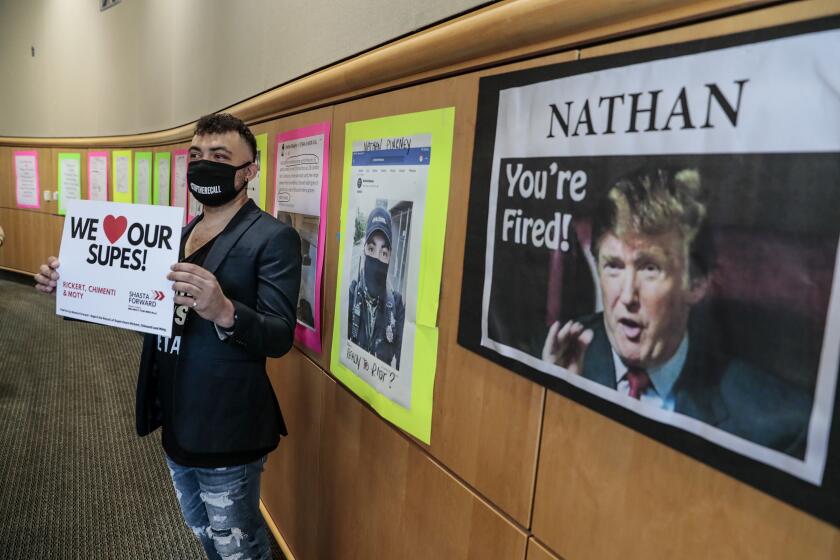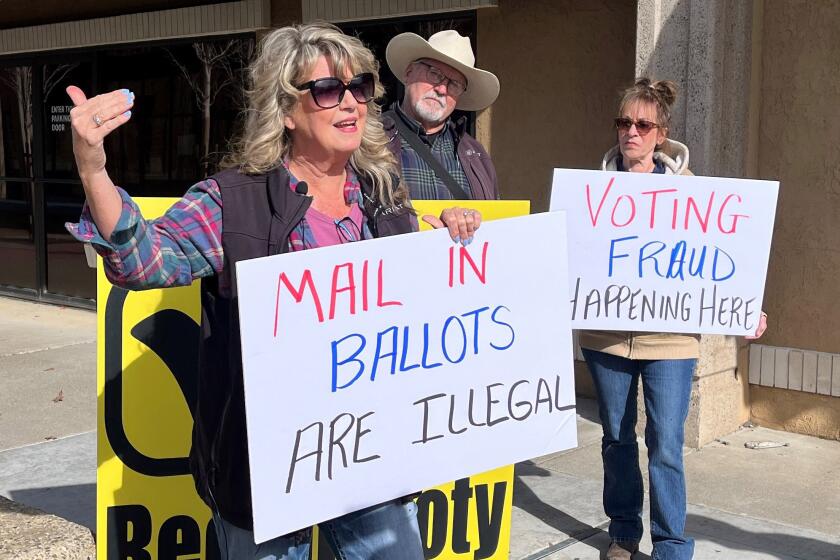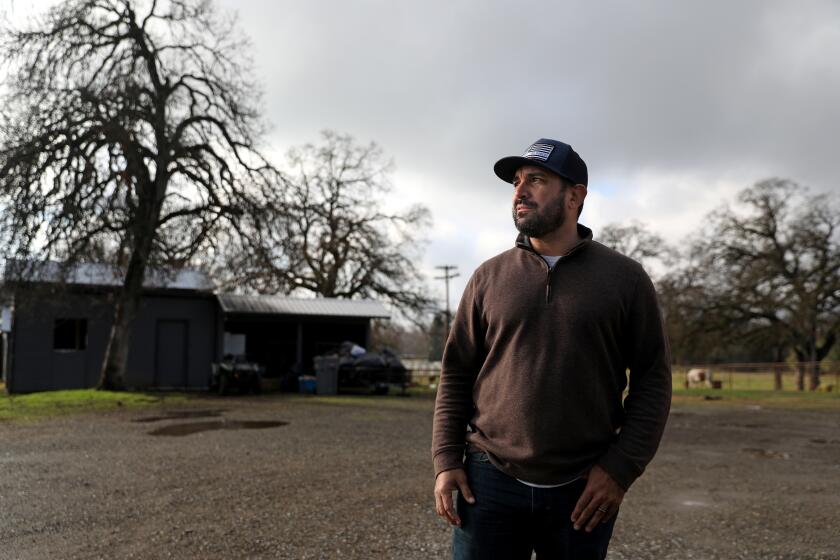The ex-Hollywood filmmaker bankrolling a far-right political revolt in rural California
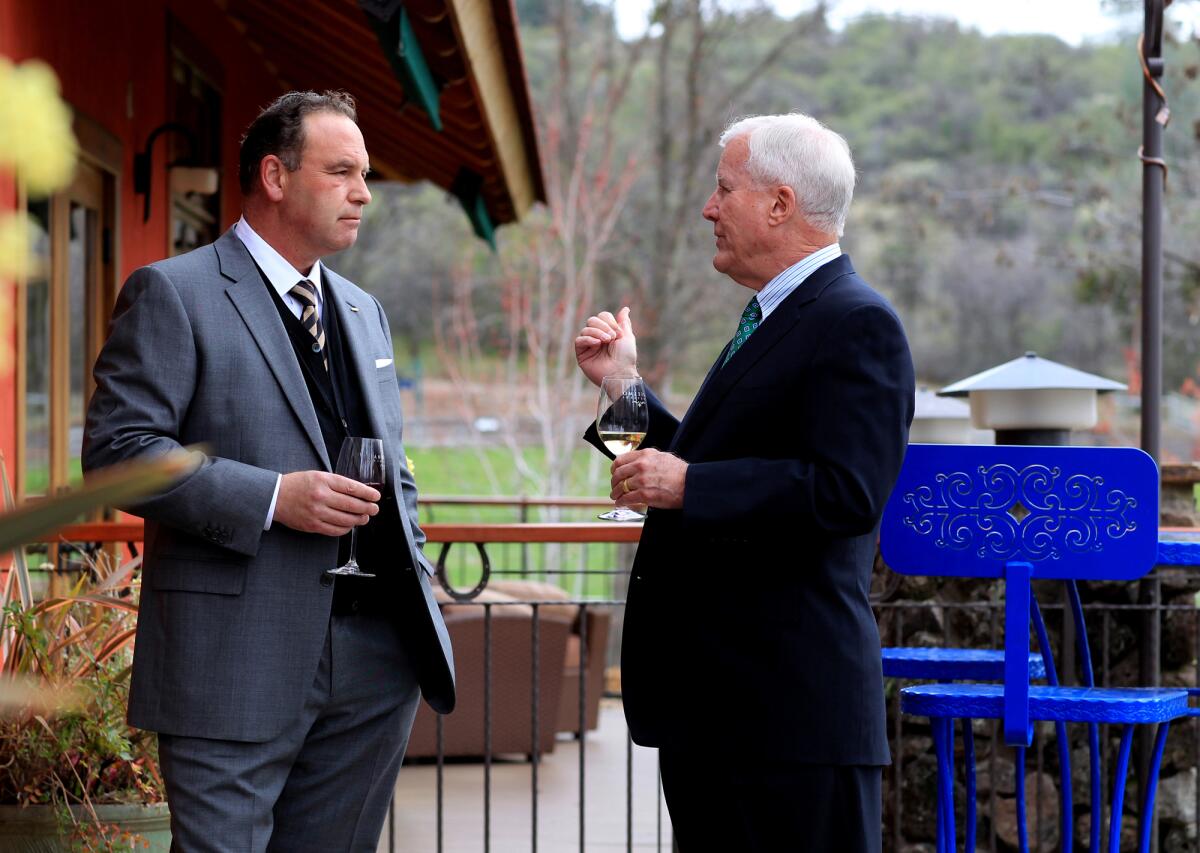
- Share via
SHINGLETOWN, Calif. — Reverge Anselmo, a former U.S. Marine, former novelist, ex-filmmaker, former vintner and guardian of a vast fortune, abandoned his stunning Shasta County estate in 2014 in a huff. He’d been battling the county over, among other things, his decision to construct a Catholic chapel without full permits on his vineyard, and after a legal setback decided to pack it in.
“It was time to go,” Anselmo said, furious that officials were in his view wrongly interfering with his land-use rights. “Who fights their way into Shasta County? Who does that?”
Then, in 2021, Anselmo learned that far-right activists were making a documentary about efforts to recall Shasta County elected officials. He summoned the film crew to his family home in Greenwich, Conn. — the one he calls “Marie Antoinette’s house” because it is modeled after the Palace of Versailles — and began contributing to their efforts.
On Feb. 1, Shasta County voters stunned the state’s political establishment by tossing Republican Supervisor Leonard Moty, a former police chief, on charges that he wasn’t conservative enough. The recall backers — a populist coalition that includes anti-mask parents, business owners, California secessionists and militia members — say they are just getting started. They plan to take control of the county by winning more Shasta posts in the June elections, while exporting their confrontational model to other communities nationwide.
Many Democrats and mainstream Republicans are aghast, fearful that far-right activists are preparing to reorder Northern California and other rural parts of the state.
“You are going to see more recall efforts taking place at the local government level,” Republican political consultant Mike Madrid warned during a radio interview last month. “Militia-style, white nationalist efforts designed to shut down local public agencies as the way to start spreading social disruption. ... It is happening already all over the place.”
Tensions are rising in Shasta County, where a far-right group wants to recall supervisors, has threatened foes and bragged about ties to law enforcement.
And indeed, just days after the election, militia members hanging out at Woody Clendenen’s barbershop in the town of Cottonwood were talking about a recent Zoom call with activists planning a recall in Nevada County. People in other counties, including San Joaquin, have also gotten in touch for advice, according to Carlos Zapata, one of the recall backers.
Amid all the cheering and handwringing, few have focused on the fact that the Shasta County election had something few other campaigns can count on — a quixotic Connecticut-bred cowboy with a grudge and bottomless pockets with which to fund his political revenge.
Anselmo has poured more than $550,000 into local Shasta County races since 2020, a record for a single individual, according to county officials.
In addition, county officials suspect Anselmo contributed additional “dark” funds to the slickly produced “Red, White and Blueprint” documentary launched by far-right activists. Contributions to that effort are not public, despite a complaint to the state Fair Political Practices Commission, but in an interview, Anselmo cheerfully confirmed the suspicion, adding that after he got involved, “I tried to get them better music.”
Subscribers get early access to this story
We’re offering L.A. Times subscribers first access to our best journalism. Thank you for your support.
Anselmo added that he is nowhere near finished. “I just sent more,” he said, including a recent check for about $180,000. “Nobody asked for the money.” He declined to provide details about where the donation was sent, except to quip that it might have gone to the “Competitive Pole-Dancers Assn. Anonymous.”
The Republican political establishment in Shasta County doesn’t mince words about what is happening to the community. Over the last year it has been home to threats of violence and civil war at public meetings, militia members patrolling racial justice rallies with concealed weapons, and at least one brawl that left an anti-recall activist with a black eye.
“I’m watching a county collapse,” said Supervisor Mary Rickert, a rancher and grandmother of six who was initially targeted for recall but granted a reprieve when not enough signatures were gathered. “They want to take over. They want to replace anyone who knows how to do anything with people that don’t know. I’m really scared.”
A Shasta County supervisors’ meeting was faced with verbal threats to government officials and talk of civil war. “You have made bullets expensive. But luckily for you, ropes are reusable,” one person threatened.
Rickert, like many in Shasta County, has devoted countless hours to trying to understand Anselmo’s psychology. She said she is mystified that Anselmo seems so determined to attack the government of a place he left long ago, especially when his business was “thriving,” his property “beautiful” and his wine “wonderful.”
“Golly sakes, everything we did we tried to help him,” added former Supervisor Glenn Hawes, whom Anselmo once sued. Hawes was among those in Shasta County who said he studied Anselmo’s autobiographical movie “Stateside” to try to gain insight into his thinking. “We could never explain why he did what he did. None of us could.”
In an interview, Anselmo provided a hint at an answer, blaming his land-use fight for fracturing his marriage.
“She married a cowboy,” he said of his ex-wife. “And by the time all this happened, I was just a guy in cowboy boots screaming on the phone to my attorney all day long. She said she had nobody to ride with anymore. I was failing as a husband, but it wasn’t my fault. Somebody had to go screaming on the phone to my attorney about Shasta County.”

By the time Anselmo, 59, arrived in Shasta County in 2005 to embrace a new role as a rancher and vintner, he had already lived many lives. In his 20s, he served in Beirut with the U.S. Marines during the bloody Lebanese civil war. After leaving the military, he stayed in a monastery and so seriously considered becoming a monk that he gave up all his possessions, he said in a court filing.
Later, in his 30s, he published a novel, “The Cadillac of Six-By’s,” based on his combat experiences in Beirut. Then he launched a movie career, producing a number of films, including the autobiographical epic “Stateside,” starring Val Kilmer, about a young man packed off to the Army by his powerful father after a drunk driving incident.
Anselmo — the son of Rene Anselmo, who founded the network that would become Univision, and later the first private satellite broadcast company — decided to leave Beverly Hills for Red State California shortly after some critics panned “Stateside.”
Democracies can fall one town at a time. In Shasta County, a militia and its supporters have put their plan into action.
He sold his storybook cottage for about $2 million, according to both property records and an interview, and purchased a stunning piece of land, perched upon a hill, with views of both Mt. Shasta and Mt. Lassen.
Anselmo says he chose Shasta County “because of my horse” — an American Racking horse named Cola Bar.
“I had a very good bond with the horse,” he said during his interview with the film crew. “So I bought the ranch. I bought it in California not because I’m a fan of California, but because I always knew that if I had to get rid of it, I could. It’s California, so I can dump it.”
Anselmo added that he did his research and learned that Shasta County didn’t fit the Golden State stereotype. The county, whose southern border is more than 100 miles north of Sacramento, is a place of cattle ranches spread across rolling green and brown hills, ribboned with streams and ringed by snow-capped mountains.
The politics among the fewer than 200,000 residents tilt libertarian and conservative. The county heavily favored Donald Trump, and is a cradle of the secessionist Jefferson State movement. Lately, a large militia based in the town of Cottonwood has been patrolling the streets of Redding to “protect” it from protests. Anselmo is a strong supporter of the militia, crediting its members with saving the county seat of Redding from antifa, which he says was “headed” for the city “trying to burn it.”
“So I said, at least I’m not going to have to deal with any craziness up there, so let’s go,” Anselmo explained.

In 2005, he incorporated an LLC called Seven Hills Land and Cattle Company and eventually purchased more than 1,500 acres near the hamlet of Shingletown. The spread included a vineyard, ranchlands and the sparkling waters of Bear Creek, a tributary of the Sacramento River that plummets in a gorgeous 200-foot waterfall right on Anselmo’s property.
Initially, Anselmo’s move to Shasta appeared to be a boon for both the county and him. He soon married a fellow horse enthusiast from Texas, and he and his wife became local celebrities. Their restaurant became a gathering place for people from all over the county, known for its free-flowing wines, delicious food and raucous parties. Anselmo became friendly with powerful county officials. He was proud of helping the sheriff search for illegal pot grows by conducting flyovers in his own helicopter.
But almost immediately, he ran into problems. What would become one of the county’s most expensive and long-fought legal battles arrived on the afternoon of Oct. 15, 2007, in the form of a state water quality inspector.
Anselmo’s crews had just completed the grape harvest and were sitting in the glowing afternoon light celebrating over a few glasses of wine when, as Anselmo later told it to a crowd of tea party activists and in a lawsuit, one of his workers burst in with news. “A fish cop” had shown up where workers were cleaning up a pasture and ordered them to stop work.
Anselmo left his party and came down to see what all the fuss was about. He soon encountered inspector Andrew Jensen, who told him that, in responding to an anonymous complaint, he found workers stirring up sediment that could flow into the south fork of Bear Creek.
“Within 24 hours, I found myself literally a bond slave to the state of California,” Anselmo later told his tea party audience. “With my back bent over, I’m spreading straw, with armed men telling me what to do.”
A high-profile militia member is among three people charged with battery in the attack of a Black Lives Matter activist in Redding, Calif.
The State Water Resources Control Board issued a fairly standard order, among hundreds issued every year, requiring cleanup and a restoration plan.
Anselmo called his lawyer. “Me and my attorneys, we fought them for 11 months, six hours a day.” The state water board rescinded its order in August 2008, according to state records, because, it said, the problem was fixed.
But by then, Anselmo had a new antagonist: Shasta County.
Alerted about the grading from the state, the county on Oct. 30, 2007, issued its own notice of violation.
County officials said it would have been a simple matter pulling permits to clear it up. That is not the course of action Anselmo chose.
“That’s a stickup,” he said. “I didn’t owe a fine.”
He was convinced, as he later said in a lawsuit, that the county had picked up the baton from the state and was now interfering with his property rights “without any lawful authority.”
Anselmo appealed to Hawes, who was then on the county Board of Supervisors and also owned the farm supply store where Anselmo was, according to both men, a very good customer. But rather than help him, Anselmo claimed Hawes insinuated the problem could be solved if Anselmo made a contribution to a mitigation bank, like the one Hawes managed.
Hawes denied that he tried to solicit such a contribution, noting that his mitigation bank doesn’t even offer those kinds of credits.
The county’s director of resource management also turned up, and, according to Anselmo, threatened to hold up certificates of occupancy on his winery if he didn’t get a grading permit.
From that point on, Anselmo was at war.
He filed a lawsuit, eventually naming the Board of Supervisors and the county’s director of resource management.
As the lawsuit raged on, Anselmo continued holding dinners and parties at his winery and flying through the skies looking for pot grows for the sheriff.
But he also took his land-use fight with the county to a new arena. He applied for permission to build a private chapel at his vineyard and commenced construction. He spared little expense, importing, among other things, bells from Belgium, travertine from Italy and relics from France.
Anselmo, in a lawsuit, describes the chapel as an expression of his deep faith. He characterized himself as “a man of the world, a man of means, and a man of faith as a devout Roman Catholic.”
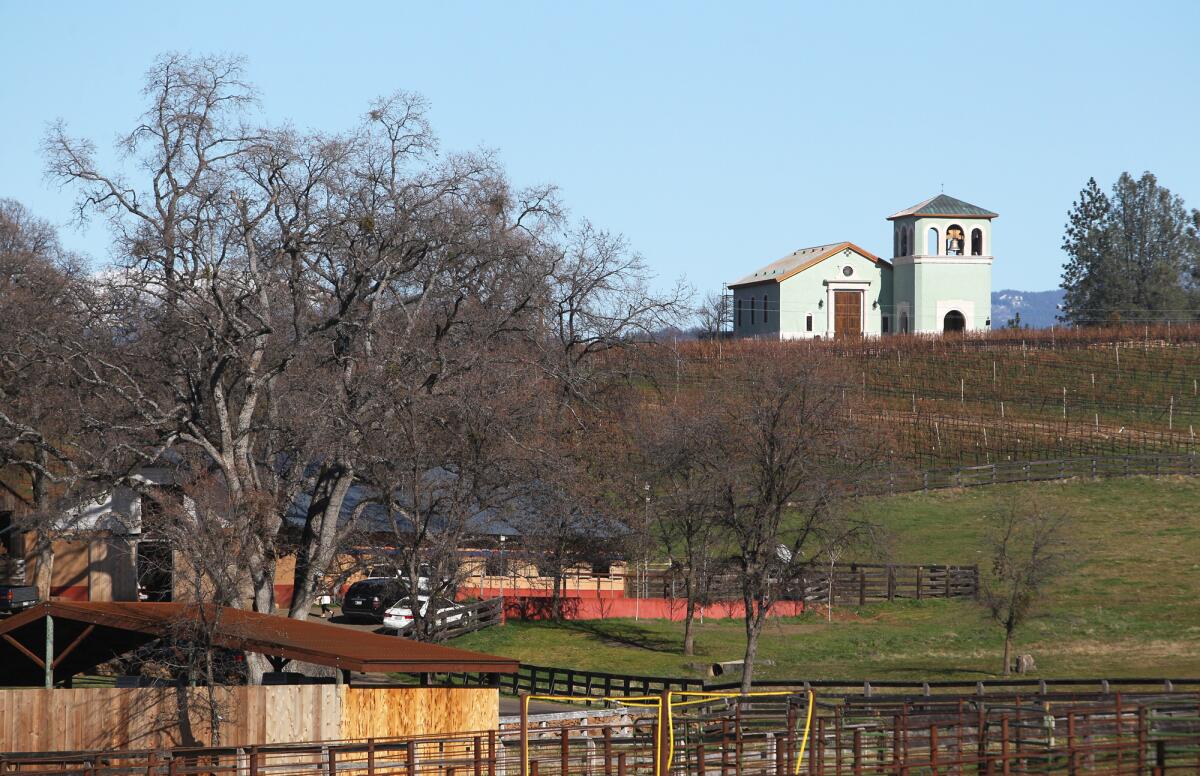
But Shasta officials raised issues about the permit and in February 2012 posted a “red tag” on the chapel. While they were out at the property, they also hung red tags on several other projects, including the office of Anselmo’s wife and his gleaming new dining room, which was a central part of his event business.
Anselmo tore down the red tags, called his lawyer and filed a freedom of religion suit in federal court. He accused the county of making trouble about his chapel “as retaliation” because of his earlier lawsuit about the grading.
The tea party then invited him to speak to a room full of activists. Shortly after that, more than 200 people turned out in front of Anselmo’s chapel to protest. “Government has been striving to kill the spirit of righteousness for too long,” one protester told the Redding Record Searchlight.
But following that public relations victory, Shasta County officials launched a counterattack, suing Anselmo and seeking injunctions that could shut down his business.
As the legal fight wore on, Anselmo’s personal life grew complicated. His mother died, and he and his wife separated. (She now lives in southern Oregon, where she owns a bed and breakfast. She declined to comment.)
Then a judge issued an early ruling in Shasta County’s favor.
In 2014, Anselmo agreed to pay nearly $1.4 million to settle with Shasta County. In under a month, he said, he split from his wife, sold his vineyards and his cattle ranch and moved away.
But he did not divest himself of his grudge against Shasta County. In 2020, he made what is believed to be the single largest campaign contribution in the history of the county — and perhaps any California county north of Sacramento — when he gave $100,000 to Patrick Jones, a former Redding mayor who manages his family’s gun store and was publicly sympathetic to Anselmo’s war with the county’s resources department.
By the time Jones took his supervisor seat in January 2021, many folks in Shasta County were in full-blown revolt against their government over COVID-19 restrictions. The recall was launched soon after. Much of the attention focused on the violent rhetoric and threats at board meetings and the spectacle of an armed militia moving into electoral politics.
But behind the scenes, Anselmo was getting ready to pour in money that could be spent on relentless television and radio advertising.
Zapata, one of the most antagonistic leaders of the Shasta revolt, said he thought the recall would have succeeded even without Anselmo’s contributions — although he was very happy to have them. “The thing you have to understand is people are fed up,” he said. “To think that a community needs a billionaire to fund this movement is completely disingenuous.”
On the day the film crew flew to Connecticut, most of Anselmo’s vast contributions to Shasta County politics hadn’t yet come in. The interviewer asked Anselmo about his horse and about his long feud with the county. And then he posed one more query.
“Would I come back? That is your question?” Anslemo paused, and gestured with his cigarette. “If you’re successful … recall the three supervisors, eliminate the whole resources management division … yeah, if you did that I’d go back.”
In his interview with The Times, Anselmo was less decisive. “You have no notions of how raped you are on a daily basis out there,” he said of living in California.
But he had no regrets. Of county officials, he said: “They’re evil, and they deserve what is coming to them.”
And of the recall proponents, he added: “The wind is at their backs. They’re going to be free. I don’t say they will be prosperous, but they will be free.”
More to Read
Sign up for Essential California
The most important California stories and recommendations in your inbox every morning.
You may occasionally receive promotional content from the Los Angeles Times.
